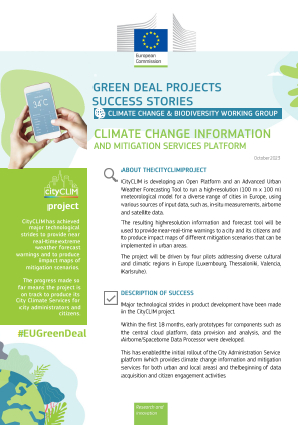About the CityClim project
CityCLIM is developing an Open Platform and an Advanced Urban Weather Forecasting Tool to run a high-resolution (100 m x 100 m) meteorological model for a diverse range of cities in Europe, using various sources of input data, such as, in-situ measurements, airborne and satellite data.
The resulting high-resolution information and forecast tool will be used to provide near-real-time warnings to a city and its citizens and to produce impact maps of different mitigation scenarios that can be implemented in urban areas.
The project will be driven by four pilots addressing diverse cultural and climatic regions in Europe (Luxembourg, Thessaloniki, Valencia, Karlsruhe).
Description of success
Major technological strides in product development have been made in the CityCLIM project.
Within the first 18 months, early prototypes for components such as the central cloud platform, data provision and analysis, and the Airborne/Spaceborne Data Processor were developed. This has enabled the initial rollout of the City Administration Service platform (which provides climate change information and mitigation services for both urban and local areas) and the beginnings of data acquisition and citizen engagement activities.
Highlights
- Early prototypes developed by month 18 (March 2023)
- Initial rollout of City Administration Service Platform for testing
- Beginning of public advertisement for citizen engagement activities
Outputs
- Advertising weather data acquisition activities in Pilot Cities: News article and TV segment for Luxembourg City
- First model outputs from the Advanced Urban Weather Model for Karlsruhe and Valencia
- Improved data storage and usage: Implementation of workflow for citizen science sensors. Establishing the central cloud platform’s Data Warehouse allows acquired data from all sources (including citizen science data) to be stored and used.
- All crucial early prototype software components for the Airborne Data Processor were successfully tested. The next step is an Airborne test campaign.
- A functional spaceborne data provider created to feed a high-resolution weather model.
- Development of models that allow the project to simulate and explore the surface heat island effects in cities using earth observation.
Impact
Different simulation model outputs can provide valuable insights to city planners and decision makers. For example, users from city administrations or the interested public can explore how Land Surface Temperature (LST) in a city changes when urban characteristics are modified (e.g., what if there was more green space instead of a parking lot).
Achieving the early prototype milestone means that City Climate Services for city administration and citizens are on track to be rolled out in the pilot cities Karlsruhe, Valencia, Thessaloniki, and Luxembourg City. Citizen science activities can then begin, promoting awareness and inspiring climate action.
Lessons
- Persevere through technical difficulties such as models crashing randomly, performance issues, dealing with model accuracy and error rates
- Keep up communication with all partners and pilot cities, as well as 3rd party providers
- Develop a common understanding and language

